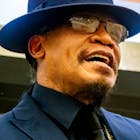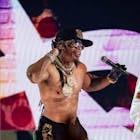In this age of viral commentary and memed quotes, nuance is often lost. And oftentimes, when having polarizing discussions, no one likes to acknowledge when "both things can be true." But here is an instance where both things can absolutely be true: Eminem is one of the best to ever do it--and Eminem benefits from being white. That shouldn't be a controversial statement; we've seen this sort of thing constantly throughout music history, from Elvis to The Bee Gees to George Michael to Adele. The problem is people need to associate villainous or nefarious intent to recognizing how racism works; sometimes the benefactor has no ill intent themselves—nonetheless, they still benefit from being white in a system that prefers white people.
Eminem has earned his spot amongst Hip-Hop greats. That the mainstream (i.e. white) platforms will always show a certain amount of bias towards him doesn't undercut his greatness. At this point in its history, rap greatness can mean a plethora of things. If you're looking to dismiss Melle Mel because he doesn't have Em's sales, you're missing the point of it all. Likewise, if you write off Em simply because he's not a pioneer like Mel, you're also missing why Em is great.
After the controversy surrounding his interview, Melle Mel took to IG Live to address accusations of racism towards Eminem.
“Melle Mel has nothing against nobody in Hip-Hop,” he says in the clip. “I’ve been in Hip-Hop for 40 years. Very competitive, really have nothing against nobody. I’m not jealous of nobody, I’m not intimidated by anybody or anything, and I’m not bitter. I just come across as I come across ’cause I’m a man and I say what I say, and when I say what I say, basically, I mean what I say.”
“Everything that I said, that I commented on, it was to comment on what he wrote and who he put on this said list. And I think Billboard is not known for Hip-Hop, of course, they’re known for records. So obviously, Billboard is more leaning toward guys that made records, compared to guys like myself that put in all the time in Hip-Hop."
“We’re responsible for the genre. We’re the biggest influences in the genre, and if you ask anybody that knows anything about true Hip-Hop, they will tell you that. If you ask anybody that calls themselves an MC, they will be the first to tell you that there is no modern day rap or Hip Hop of that nature if it wasn’t for Grandmaster Flash, if it wasn’t for the Furious Five, if it wasn’t for Melle Mel, if it wasn’t for [Keef] Cowboy.”
“Like I said, the word ‘Hip-Hop’ came from my crew.”








